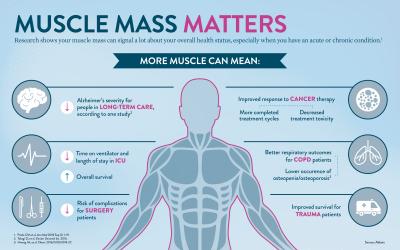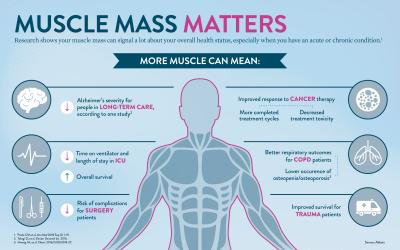
Credit: Abbott
- A comprehensive review published in Annals of Medicine confirms low muscle mass is linked to an increased risk of serious health complications and decreased survival
- Growing scientific evidence suggests muscle mass should be a key factor in evaluating a person's health status, especially if living with a chronic disease
ABBOTT PARK, Ill., Oct. 18, 2018 — Adults go to the doctor roughly three times a year.1 During their visit, vitals are taken such as blood pressure, pulse, and weight, but are these measurements really showing the full picture of a person's overall health? Extensive research shows health care professionals should be considering something often overlooked — muscle mass. A new review paper published in Annals of Medicine, and supported by Abbott, confirms the critical role muscle mass plays in health with studies demonstrating that people with less muscle had more surgical and post-operative complications, longer hospital stays, lower physical function, poorer quality of life and overall lower survival.2
The review examined the latest research over the course of a year (January 2016 – January 2017) including more than 140 studies in inpatient, outpatient and long-term care settings, and had one resounding conclusion — muscle mass matters. The data show muscle mass can say a lot about a person's overall health status, especially if living with a chronic disease. For example:
- A study in the Journal of the American Medical Association (JAMA) showed women with breast cancer who had more muscle had a nearly 60 percent better chance of survival.3
- Patients in the intensive care unit (ICU) with more muscle spend less time on the ventilator — as well as less time in the ICU — and have a better chance of survival.4,5,6
- People with chronic obstructive pulmonary disease (COPD) who have more muscle experience better respiratory outcomes and lower occurrence of osteopenia or osteoporosis.7,8
- In the long-term care setting, a study found individuals with lower muscle mass had more severe Alzheimer's.9
"Muscle mass should be looked at as a new vital sign," said Carla Prado, Ph.D., R.D., associate professor at the University of Alberta and principal author of the paper. "If healthcare professionals identify and treat low muscle mass, they can significantly improve their patients' health outcomes. Fortunately, advances in technology are making it easier for practitioners to measure muscle mass."
MUSCLE UP FOR BETTER HEALTH
For decades, healthcare professionals have relied on body mass index (BMI) to assess a person's health, mainly because it requires a simple calculation. But, this measurement can be misleading since it doesn't distinguish between muscle mass and fat mass. Low muscle mass can occur at any body weight, so someone who is normal weight may appear healthy, when they can in fact lack muscle. While there's potential for body composition tools — which measure muscle mass — to become more routinely used and available in healthcare settings, health professionals can use screening questionnaires and other simple methods to identify people at risk.
"Muscle may be skin deep, but it should be top of mind based on the growing body of science," said Suzette Pereira, Ph.D., research scientist at Abbott and one of the paper authors. "Something as simple as the firmness of a person's handshake can give a lot of insight into their overall health, and it's never too late to rebuild muscle with good nutrition, including protein, and proper exercise."
To learn more about the signs of muscle loss and get tips for regaining strength, visit Abbott's Nutrition Newsroom.
###
About The Study
Implications of Low Muscle Mass Across the Continuum of Care: A Narrative Review was published online in Annals of Medicine, a peer-reviewed open access journal. The aim of this editorial review was to evaluate 143 relevant studies from January 2016 to January 2017 via PubMed that looked at the role of low muscle mass on health outcomes. Articles were organized by clinical care settings: inpatient (surgery, cardiovascular disease, renal disease, chronic obstructive pulmonary disease, critical illness, and "other"), outpatient (cancer, liver conditions and primary care), as well as long-term care.
About Abbott
At Abbott, we're committed to helping people live their best possible life through the power of health. For more than 125 years, we've brought new products and technologies to the world — in nutrition, diagnostics, medical devices and branded generic pharmaceuticals — that create more possibilities for more people at all stages of life. Today, 99,000 of us are working to help people live not just longer, but better, in the more than 150 countries we serve.
Connect with us at http://www.abbott.com, on Facebook at http://www.facebook.com/Abbott and on Twitter @AbbottNews and @AbbottGlobal.
References:
1 National Ambulatory Medical Care Survey: 2015 State and National Summary.
2 Prado CM, et al. Ann Med. 2018;e-pub ahead of print.
3 Caan BJ, et al. JAMA. 2018;4(6):798-804.
4 Weijs PF, et al. Crit Care. 2014;18(2):R12.
5 Moisey LL, et al. Crit Care. 2013;17(5):R206.
6 Akahoshi T, et al. Acute Medicine & Surgery.2016;3:326-31.
7 Pothirat C, et al. J Med Assoc Thai.2016;99(4)386-93.
8 Hwang JA, et al. Chest. 2016;151(5):1018-27.
9 Takagi D, et al. Geriatr Gerontol Int. 2016.
Media Contact
Abbott
Molly Cornbleet
224-667-7622
Related Journal Article
http://dx.doi.org/10.1080/07853890.2018.1511918





